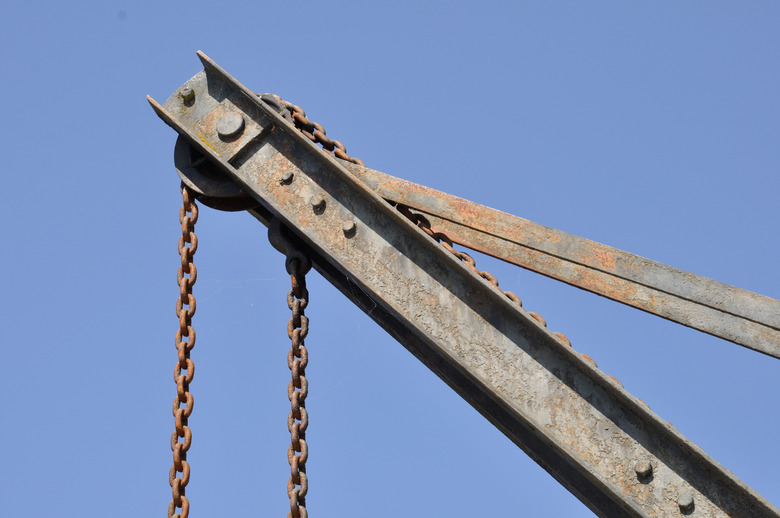How To Calculate AMA & IMA Of Simple Machines
Although you might think of a machine as complex system of gears, drive belts and and a motor, the definition physicists use is much simpler. A machine is simply a device that does work, and there are only six different types of simple machines. They include the lever, the pulley, the wheel and axle, the screw, the wedge and the inclined plane. The ability of the machine to do work is dependent on two characteristics: its mechanical advantage and its efficiency. There are two type of mechanical advantage. The ideal mechanical mechanical advantage assumes perfect efficiency which doesn't account for friction, while the actual mechanical advantage does.
TL;DR (Too Long; Didn't Read)
The AMA of a simple machine is the ratio of output to input forces. The IMA is the ratio of input distance to output distance.
Actual Mechanical Advantage
Actual Mechanical Advantage
Any type of machine transmits mechanical energy, and a measure of its usefulness is the ratio of the output force (FO) to the input force (FI). This ratio is the actual mechanical advantage:
\(AMA=\frac{F_O}{F_I}\)
If this ratio is one, the mechanical machine doesn't actually make it easier to do a job, but it may transmit the energy in a different direction. A worm-drive gear is an example of such a machine. Most machines have an AMA greater than one.
Ideal Mechanical Advantage
Ideal Mechanical Advantage
Because a certain amount of the input force is needed to overcome friction, and this amount is unknown, it can be difficult to measure actual mechanical advantage. The ideal mechanical advantage, on the other hand, is simply the ratio of the input distance _DI_ to the output distance _DO_.
\(IMA=\frac{D_I}{D_O}\)
To make the work easier for the user, the input distance should be larger than the output distance, so this ratio is usually greater than one. It's also larger than the AMA, because it doesn't take frictional forces, which oppose motion, into account.
IMA of the Six Types of Machines
IMA of the Six Types of Machines
All real machines are a combination of the six simple machines, and the method for calculating IMA varies for each.
Lever: The placement of the fulcrum determines the IMA for a lever. In a first-class lever, the fulcrum is under the lever, and located distances _DI_ and _DO_ from the input and output ends respectively. The ideal mechanical mechanical advantage is thus:
\(IMA=\frac{D_I}{D_O}\)
Wheel and Axel: With two concentric wheels, as used in conjunction, you get a mechanical advantage by applying force to the larger one and connecting a load to the smaller one. The IMA for this arrangement is the ratio of the radius of the larger wheel R to that of the smaller one r:
\(IMA=\frac{R}{r}\)
**Inclined Plane:** The mechanical advantage of an inclined plane increases as the slope decreases, but even though a smaller force is needed to push it, the distance you need to push it increases. Push the load a distance L along the slope to raise it to a height h, and the ideal mechanical advantage is:
\(IMA=\frac{L}{h}\)
Wedge: Like an inclined plane, the force needed to push it under a load increases with the slope, but the distance the wedge needs to go L to separate the surfaces, the distance t increases:
\(IMA=\frac{L}{t}\)
Screw: A screw is just a circular inclined plane. With each turn of the screw, you rotate it a distance equal to the circumference to move it a distance P into the surface it penetrates. If the diameter of the screw shaft is d, the mechanical advantage is:
\(IMA=\frac{2\pi d}{P}\)
Pulley: The mechanical advantage of a pulley system depends only on the number of ropes it has. If that number is N, then
\(IMA=N\)
IMA = N
Cite This Article
MLA
Deziel, Chris. "How To Calculate AMA & IMA Of Simple Machines" sciencing.com, https://www.sciencing.com/calculate-ama-ima-simple-machines-7418860/. 5 December 2020.
APA
Deziel, Chris. (2020, December 5). How To Calculate AMA & IMA Of Simple Machines. sciencing.com. Retrieved from https://www.sciencing.com/calculate-ama-ima-simple-machines-7418860/
Chicago
Deziel, Chris. How To Calculate AMA & IMA Of Simple Machines last modified August 30, 2022. https://www.sciencing.com/calculate-ama-ima-simple-machines-7418860/
